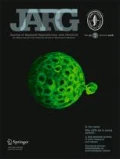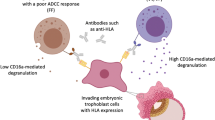Abstract
Purpose
Immune response to infections has been associated with recurrent pregnancy loss (RPL). Low plasma mannose binding lectin (MBL) levels, an innate immunity factor in infections, has been related to RPL. In this study, we tested the hypothesis that MBL genotypes that are known to cause reduced plasma MBL levels are significantly more frequent among women experiencing unexplained RPL.
Methods
This study included 219 Caucasian women diagnosed with unexplained RPL and 236 control women. All participants were genotyped for two promoter (−550 C > G and −221 G > C) and three missense (R52C, G54D and G57E) mutations in exon 1. These mutations are known to be associated with variations in plasma MBL levels. Genotype frequencies were estimated by gene counting and were compared to the expectation of Hardy-Weinberg equilibrium by chi-squared (X 2) analysis and Fisher’s exact test. Allele and genotype frequencies were compared in cases and controls using X 2 contingency table analysis.
Results
There was no difference in demographics between cases and controls. The number of miscarriages in the participants with RPL ranged from 2 to 10 spontaneous abortions (SAB’s) per participant. Populations genotyped were in Hardy-Weinberg equilibrium. There was no association between a history of RPL and multi-SNP genotypes at the MBL locus. In unexplained RPL, the number of SAB’s and live birth rates were unaffected by MBL genotype. There was no association between MBL genotype and the risk of unexplained RPL. The occurrence of live birth was not associated with MBL genotype.
Conclusion
Genotypes known to cause low MBL plasma levels are not associated with an increased risk of unexplained RPL.


Similar content being viewed by others
References
Girardi G, Salmon JB. The role of complement in pregnancy and fetal loss. Autoimmunity. 2003;36(1):19–26.
Lanasa MC, Hogge WA, Kubik CJ, Ness RB, Harger J, Nagel T, et al. A novel X chromosome-linked genetic cause of recurrent spontaneous abortion. Am J Obstet Gynecol. 2001;185(3):563–8.
Gilchrist DM, Livingston JE, Hurlburt JA, Wilson RD. Recurrent spontaneous pregnancy loss. Investigation and reproductive follow-up. J Reprod Med. 1991;36(3):184–8.
Harger JH, Archer DF, Marchese SG, Muracca-Clemens M, Garver KL. Etiology of recurrent pregnancy losses and outcome of subsequent pregnancies. Obstet Gynecol. 1983;62(5):574–81.
Pfeiffer K, Fimmers R, Engels G, van der Ven H, van der Ven K. The HLA-G genotype is potentially associated with idiopathic recurrent spontaneous abortion. Mol Hum Reprod. 2001;7(4):373–8.
Stray-Pedersen B, Stray-Pedersen S. Etiologic factors and subsequent reproductive performance in 195 couples with a prior history of habitual abortion. Am J Obstet Gynecol. 1984;148(2):140–6.
Hogge WA, Prosen TL, Lanasa MC, Huber HA, Reeves MF. Recurrent spontaneous abortion and skewed X-inactivation: is there an association? Am J Obstet Gynecol. 2007;196(4):384 e1-6.
Rock JA, Zacur HA. The clinical management of repeated early pregnancy wastage. Fertil Steril. 1983;39(2):123–40.
Stirrat GM. Recurrent miscarriage. II: clinical associations, causes, and management. Lancet. 1990;336(8717):728–33.
Nuovo GJ, Cooper LD, Bartholomew D. Histologic, infectious, and molecular correlates of idiopathic spontaneous abortion and perinatal mortality. Diagn Mol Pathol. 2005;14(3):152–8.
Baxter N, Sumiya M, Cheng S, Erlich H, Regan L, Simons A, et al. Recurrent miscarriage and variant alleles of mannose binding lectin, tumour necrosis factor and lymphotoxin alpha genes. Clin Exp Immunol. 2001;126(3):529–34.
Carey JC, Klebanoff MA, Hauth JC, Hillier SL, Thom EA, Ernest JM, et al. Metronidazole to prevent preterm delivery in pregnant women with asymptomatic bacterial vaginosis. National Institute of Child Health and Human Development Network of Maternal-Fetal Medicine Units. N Engl J Med. 2000;342(8):534–40.
McDonald HM, O’Loughlin JA, Vigneswaran R, Jolley PT, Harvey JA, Bof A, et al. Impact of metronidazole therapy on preterm birth in women with bacterial vaginosis flora (Gardnerella vaginalis): a randomised, placebo controlled trial. Br J Obstet Gynaecol. 1997;104(12):1391–7.
Erlebacher A. Immunology of the maternal-fetal interface. Annu Rev Immunol. 2013.
Sanguansermsri D, Pongcharoen S. Pregnancy immunology: decidual immune cells. Asian Pac J Allergy Immunol. 2008;26(2–3):171–81.
Christiansen OB. Reproductive immunology. Mol Immunol. 2012. Epub 2012/10/16.
Kilpatrick DC. Mannan-binding lectin concentration during normal human pregnancy. Hum Reprod. 2000;15(4):941–3.
Kilpatrick DC, Starrs L, Moore S, Souter V, Liston WA. Mannan binding lectin concentration and risk of miscarriage. Hum Reprod. 1999;14(9):2379–80.
Madsen HO, Garred P, Kurtzhals JA, Lamm LU, Ryder LP, Thiel S, et al. A new frequent allele is the missing link in the structural polymorphism of the human mannan-binding protein. Immunogenetics. 1994;40(1):37–44.
Madsen HO, Garred P, Thiel S, Kurtzhals JA, Lamm LU, Ryder LP, et al. Interplay between promoter and structural gene variants control basal serum level of mannan-binding protein. J Immunol. 1995;155(6):3013–20.
Harrison E, Singh A, Morris J, Smith NL, Fraczek MG, Moore CB, et al. Mannose-binding lectin genotype and serum levels in patients with chronic and allergic pulmonary aspergillosis. Int J Immunogenet. 2012;39(3):224–32.
Bouwman LH, Roos A, Terpstra OT, de Knijff P, van Hoek B, Verspaget HW, et al. Mannose binding lectin gene polymorphisms confer a major risk for severe infections after liver transplantation. Gastroenterology. 2005;129(2):408–14.
Turner MW. The role of mannose-binding lectin in health and disease. Mol Immunol. 2003;40(7):423–9.
van de Geijn FE, Roos A, de Man YA, Laman JD, de Groot CJ, Daha MR, et al. Mannose-binding lectin levels during pregnancy: a longitudinal study. Hum Reprod. 2007;22(2):362–71.
Laisk T, Peters M, Salumets A. Mannose-binding lectin genotypes: potential role in tubal damage and adverse IVF outcome. J Reprod Immunol. 2011;92(1–2):62–7.
Vianna P, Da Silva GK, Dos Santos BP, Bauer ME, Dalmaz CA, Bandinelli E, et al. Association between mannose-binding lectin gene polymorphisms and pre-eclampsia in Brazilian women. Am J Reprod Immunol. 2010;64(5):359–74.
Christiansen OB, Nielsen HS, Lund M, Steffensen R, Varming K. Mannose-binding lectin-2 genotypes and recurrent late pregnancy losses. Hum Reprod. 2009;24(2):291–9.
Berger DS, Hogge WA, Barmada MM, Ferrell RE. Comprehensive analysis of HLA-G: implications for recurrent spontaneous abortion. Reprod Sci. 2010;17(4):331–8.
Lanasa MC, Hogge WA. X chromosome defects as an etiology of recurrent spontaneous abortion. Semin Reprod Med. 2000;18(1):97–103.
Lanasa MC, Hogge WA, Hoffman EP. Sex Chromosome Genetics ‘99. The X chromosome and recurrent spontaneous abortion: the significance of transmanifesting carriers. Am J Hum Genet. 1999;64(4):934–8.
Hatasaka HH. Recurrent miscarriage: epidemiologic factors, definitions, and incidence. Clin Obstet Gynecol. 1994;37(3):625–34.
Matsushita M, Hijikata M, Matsushita M, Ohta Y, Mishiro S. Association of mannose-binding lectin gene haplotype LXPA and LYPB with interferon-resistant hepatitis C virus infection in Japanese patients. J Hepatol. 1998;29(5):695–700.
Roelofs RW, Sprong T, de Kok JB, Swinkels DW. PCR-restriction fragment length polymorphism method to detect the X/Y polymorphism in the promoter site of the mannose-binding lectin gene. Clin Chem. 2003;49(9):1557–8.
Fakhrai-Rad H, Pourmand N, Ronaghi M. Pyrosequencing: an accurate detection platform for single nucleotide polymorphisms. Hum Mutat. 2002;19(5):479–85.
Christiansen OB, Kilpatrick DC, Souter V, Varming K, Thiel S, Jensenius JC. Mannan-binding lectin deficiency is associated with unexplained recurrent miscarriage. Scand J Immunol. 1999;49(2):193–6.
Kruse C, Rosgaard A, Steffensen R, Varming K, Jensenius JC, Christiansen OB. Low serum level of mannan-binding lectin is a determinant for pregnancy outcome in women with recurrent spontaneous abortion. Am J Obstet Gynecol. 2002;187(5):1313–20.
Evaluation and treatment of recurrent pregnancy loss: a committee opinion. Fertil Steril. 2012;98(5):1103–11.
Clark DA, Coulam CB, Daya S, Chaouat G. Unexplained sporadic and recurrent miscarrage in the new millennium: a critical analysis of immune mechanisms and treatments. Hum Reprod Update. 2001;7(5):501–11.
ACOG practice bulletin: management of recurrent early pregnancy loss. 24 ed: Int J Gynecol Obstet; 2001. p. 179–90.
Author information
Authors and Affiliations
Corresponding author
Additional information
Capsule
Population variation in the mannose binding lectin gene is not a risk factor for recurrent pregnancy loss.
Rights and permissions
About this article
Cite this article
Berger, D.S., Merhi, Z., Hogge, W.A. et al. Mannose binding lectin genotypes are not associated with increased risk of unexplained recurrent pregnancy loss. J Assist Reprod Genet 30, 723–727 (2013). https://doi.org/10.1007/s10815-013-9985-1
Received:
Accepted:
Published:
Issue Date:
DOI: https://doi.org/10.1007/s10815-013-9985-1




